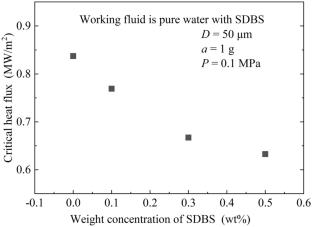Experimental Investigation of Critical Heat Flux of Nucleate Pool Boiling of Water and Nanofluid on Platinum Wire Under Hypergravity and Earth Gravity
Abstract
The experimental investigation of the critical heat flux (CHF) of saturated nucleate pool boiling of pure water and water-based Al2O3 nanofluids on the platinum wire with a diameter of 50 μm was conducted under earth gravity and hypergravity. The gravity level ranges from 1 to 3 g, the saturation pressures range from 0.1 to 0.6 MPa, and the Al2O3 concentration in the nanofluids ranges from 0.001wt% to 0.015wt%. The experimental results show that both pressure and gravity are vital factors enhancing the CHF, with the effect of pressure more pronounced. For nanofluids with concentration C > 0.005wt %, CHF initially increased with the increase in gravity. When the gravity is greater than 2 g, CHF does not increase further with the increase in gravity. Increasing nanoparticle concentration significantly enhances the CHF for low nanoparticle concentrations less than 0.005 wt%, and the CHFs change little for further increasing the concentration. Nanofluid has a stronger enhancement to the pool boiling CHF than the combination of the heating surface coated with the same kind of nanoparticles and the base fluid. With the increase of particles concentration, Surface modification gradually becomes dominant mechanism for CHF enhancement.


 求助内容:
求助内容: 应助结果提醒方式:
应助结果提醒方式:


